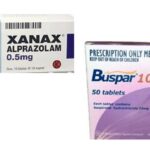Is Xanax A Barbiturate?

Barbiturates are a class of drugs that act as central nervous system (CNS) depressants, meaning that they slow down brain activity and can produce sedation and sleep. They are often prescribed for their sedative and hypnotic effects, as well as for their anticonvulsant properties.
Barbiturates have a long history of use in medicine, dating back to the early 1900s. They were commonly prescribed for a range of conditions, including anxiety, insomnia, epilepsy, and as anesthesia during surgical procedures. However, due to their potential for abuse and dependence, as well as the risk of overdose, their use has become much less common in recent years.
Barbiturates are classified as controlled substances in many countries and are strictly regulated due to their potential for abuse and addiction. They should only be used under the supervision of a healthcare provider and according to their prescribed dosage and schedule.
Is Xanax a barbiturate?
No, Xanax (generic name: alprazolam) is not a barbiturate. Xanax belongs to a class of drugs called benzodiazepines, which work by enhancing the effects of a neurotransmitter called GABA in the brain. Barbiturates, on the other hand, are a class of drugs that act as central nervous system depressants by enhancing the effects of GABA in the brain in a different way.
Xanax (alprazolam) and barbiturates are both central nervous system (CNS) depressants and can produce similar effects such as sedation, relaxation, and a sense of calm. They are often prescribed for similar conditions such as anxiety and insomnia, and they work by enhancing the activity of the neurotransmitter gamma-aminobutyric acid (GABA) in the brain, which helps to reduce overactivity and promote relaxation.
However, there are also some important differences between Xanax and barbiturates. Xanax is a benzodiazepine, which is a different class of drugs from barbiturates. Benzodiazepines are generally considered to be safer and less addictive than barbiturates, although they can still be habit-forming if used improperly or for extended periods of time. Xanax also has a shorter duration of action than most barbiturates, meaning that its effects wear off more quickly.
In general, both Xanax and barbiturates should only be used under the supervision of a healthcare provider and according to their prescribed dosage and schedule. They can both be dangerous if used improperly or in combination with other substances that depress the CNS, such as alcohol or opioids.
Can Xanax and barbiturates be taken together?
No, Xanax (alprazolam) and barbiturates should not be taken together unless specifically directed by a doctor with a thorough understanding of the potential risks and benefits. Both medications are central nervous system (CNS) depressants and can cause severe respiratory depression, sedation, and even death when taken in excessive amounts or combined with other CNS depressants.
Barbiturates are generally considered more potent and longer-lasting than benzodiazepines like Xanax, and the combination of the two can increase the risk of overdose and other serious side effects. It is important to always follow the prescribing instructions provided by a healthcare provider and to avoid combining any medications without first discussing the risks and benefits with a healthcare provider.
Does Xanax and barbiturates produce the same side effects?
Xanax (alprazolam) and barbiturates can produce similar side effects because they are both central nervous system (CNS) depressants. Common side effects of both medications can include dizziness, drowsiness, impaired coordination, confusion, and memory problems.
However, barbiturates are generally considered to have a higher risk of serious side effects compared to Xanax. Barbiturates can cause severe respiratory depression, which can be life-threatening, especially when taken in excessive amounts or combined with other CNS depressants such as alcohol or opioids. Barbiturates can also cause a range of other serious side effects, including dependence, addiction, tolerance, withdrawal, and overdose.
Xanax, on the other hand, has a lower risk of respiratory depression and is generally considered to be safer than barbiturates. However, Xanax can still cause dependence, addiction, tolerance, and withdrawal, especially when used long-term or in high doses.
It is important to note that the specific side effects of any medication can vary from person to person and can depend on various factors, including age, health status, and other medications being taken. It is essential to follow the prescribing instructions provided by a doctor or healthcare provider and to report any side effects promptly.
What are the withdrawal symptoms of Xanax?
Xanax can be habit-forming and can lead to withdrawal symptoms when use is stopped or reduced abruptly. The symptoms of Xanax withdrawal can range from mild to severe and can include:
1. Anxiety and restlessness
2. Insomnia or disturbed sleep
3. Irritability
4. Nausea and vomiting
5. Tremors and muscle spasms
6. Sweating
7. Headaches
8. Seizures
9. Delirium or hallucinations
10. Increased heart rate and blood pressure
The severity and duration of Xanax withdrawal symptoms can depend on factors such as the dosage, length of use, and individual factors such as age, overall health, and genetics. It is important to talk to a healthcare provider before stopping or reducing Xanax use to avoid withdrawal symptoms and to safely manage the tapering process.
What are the withdrawal symptoms of barbiturates?
Barbiturates were commonly used in the past to treat anxiety, insomnia, and seizure disorders but have now been replaced mostly by benzodiazepines. Barbiturate withdrawal can be dangerous and can result in severe symptoms. The symptoms of barbiturate withdrawal can vary depending on the dosage, length of use, and individual factors such as age, overall health, and genetics. Some common symptoms of barbiturate withdrawal include:
1. Anxiety and restlessness
2. Insomnia or disturbed sleep
3. Nausea and vomiting
4. Sweating
5. Tremors and muscle spasms
6. Hallucinations
7. Seizures
8. Delirium
9. High fever
10. Irregular heartbeat
Withdrawal from barbiturates can be life-threatening, and medical supervision is required during the withdrawal process. In some cases, medication-assisted treatment may be necessary to manage symptoms and prevent complications. It is important to talk to a healthcare provider before stopping or reducing barbiturate use.





